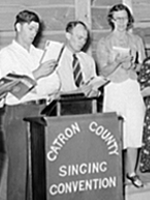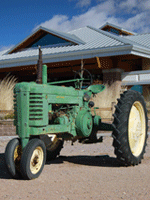
King, Alice and King, BruceAbout | Story: Raising a Joyful Noise | Abstract AboutBegins with remarks about King Building at Museum, role in creating the institution. Shifts to history of the King and Martin families and their ranching and farming operations.
Story: Raising a Joyful Noise
Alice King: While we were young people growing up there were a lot of people who really enjoyed singing and playing their instruments and things, and so they organized a group through the church, but it wasn't all through the church. A lot of it was just organizations, people who liked to sing. Once a month? Bruce King: Yeah, once a month. AK: They would have what they called a singing convention. And everybody would go to those different ones, the different family groups and quartets and trios and choirs and people who sang individually. And a number in my family were pretty musical, and so we always went to those singings. BK: And we would always take a basket lunch, so they'd make it an all-day affair. And they'd work all the way from Torrance to Stanley, every little community in between, you know, be it Estancia or it'd be what, that Frost community? AK: And Ewing and... BK: Ewing, right, and, I remember, very well that's the reason Alice and I knew so many of the same people, is the singing conventions more than anything else. It was great entertainment, really. AK: But everybody participated. BK: And as Alice said they were expected to sing Christian songs but not necessarily all together. They were Christian oriented, I'd say, of course, but anyway, the singing conventions were a big part of the development of the homestead rural areas. I'm sure they did the same thing all over Eastern New Mexico. AK: But music was a big part of our life, and my mother played piano, and she didn't read music. She played it by ear, and so we sang in our home, too. BK: Then when I got out of the Army in 1946, well, the first weekend I was home, the first Sunday night, one of the young men exactly my age that lived right close to Alice, a George Blackwell, he came over, and he'd been in the Marines and he got out a month or two before I did, and he came and he said, "Well, Bruce, let's go to church." So, they always went to church in the area, so I said, "Okay." So, we went to church, and that's where I met Alice, that first night that I'd gone to church after I got out of the Army. I don't know whether I'd got out yet, but I was home on furlough. We went to a party, and a singing party and stuff that night, and Alice and I amazingly began to kinda go together. I guess I'd been gone so long I was kinda interested in the young ladies, and kind of interested in settling down a little bit and getting around to where I could go to work. So Alice was getting around about in senior high school so, we went to church and even helped as officers in the young people's meetings for our first year. AK: I don't think they do very much anymore. BK: Yeah. I don't know if they do or not. I guess not. AK: (Laughs.) I don't hear that anymore. I don't know that they do that anymore. (Laughs.) But that's what we did as young people then. Abstract
Tape 1, Side A
Bruce King lists most of family who attended building ceremony. Proud of family heritage in the Estancia Valley. Briefly outlines his political history. Nothing more appropriate to them than to name the Museum for them. Bruce recounts early efforts to create the Museum. Tells story about working with Gerald Thomas, Bill Stephens, and people in the Legislature. Alice mentions need to work with Appropriations Committee and Bill Stephens always saying "we need a little bit more." Bruce mentions Permanent School Fund. Talks about Alice hosting breakfasts at the Governor's Mansion to discuss the project funding. Discusses placement of museum under New Mexico State University versus the State Office of Cultural Affairs. Talks about Bill Stalls and his involvement. Alice says as museum grew it would get better support from the State. More difficult to maintain funding through the University. Lots of university people were involved in the project anyway, so it did not make much difference. Mentions groundbreaking ceremony. Briefly talks about other original board members. Talks at some length about Tom Bollack Sr., and mentions Bill Porter anecdote. Not too difficult convincing people to help fund the Museum. Feels Museum has done good job saving machinery. Emphasis now needs to be on educating the public about the importance and role of agriculture. Notes how much agriculture, costs, and machinery have changed over the years. Begins reviewing family histories. Alice talks about how the Martins came to the Moriarity area as homesteaders and dryland farmers. Bruce talks about how his parents came from Texas to the Stanley/Estancia Valley area in 1917. Traded Model T for an unproven homestead. Talks about hard, dry years in the 1920s. Bought up neighboring properties as others moved out; mix of dryland farms and rangeland. Started installing irrigation wells after getting married in 1947. Continued to purchase more lands, breaking out more for bean farming.
Tape 1, Side B
Talks about selling milk in Santa Fe, some shipped by rail to Colorado. Remembers Kings getting their first tractor. Talks about New Deal programs, soil conservation programs, and the Soil Bank. Relates how President Eisenhower visited New Mexico to see how bad the drought was. In wrapping up, Alice talks about how she hopes their kids and grandkids can stay in agriculture as a living. If agriculture and transportation changes as much for them as it did during their [Bruce and Alice's] lives, who knows what it will be like. Bruce relates concerns about how they had good living with 200 cows and a little bit of crops, but today you cannot hardly make a living with the same numbers of animals, so corporations are taking over more.
Tape 2, Side A
Begins with discussion of homesteading and family members. Alice tells her family history, recalls life as a child, and growing up in the community. She recalls that they didn't think that they were poor because everyone lived the same way. Alice recalls working with thrashing machines and how her grandparents would go from farm to farm, helping others bring in their crops. She says that church activities were important in the community, and shares how she met Bruce. Bruce talks about his life as a child and what a typical day was like. Irrigation wells, pinto beans, the switch to corn silage, and feed lots are discussed. Bruce describes the "singing convention", a common event in rural areas that offered the youth the opportunity to socialize and meet future mates. He states, "It was a long way to court in those days, when we didn't' have very good ways of getting around." Singing was very popular in those days, and Bruce comments that the Estancia area had "quite a lot of talent." Folks often played musical instruments and Bruce recalls that music was a big part of his family life. When asked about his childhood, Bruce says, "it was very exciting." A typical day on the farm is explained, and a detailed account of the milking business is given. Chores, and life on the farm are discussed. He recalls that his father had a lot of help at harvest time, and that San [Santo] Domingo Indians worked for him as well as families from Oklahoma who traveled and worked on their way to California.
Tape 2, Side B
Bruce talks about how he became involved with the Farm Bureau and how he got his start in politics. There is a brief discussion about the philosophical differences between the Farmer's Union and the Farm Bureau. Irrigation wells, how they were powered, and the costs involved, as well as the crops that were planted are discussed. There is a discussion regarding how the family got started in the propane business. The decision to do dryland farming is also discussed. Don King joins the conversation. Over the years the King family has purchased neighboring farms, and continued to expand their holdings. These lands were used for farming and ranching. Alice recalls that Bruce's father would purchase land any time he had extra money, and this practice was passed on to the boys. Bruce and Alice's early years as a married couple are discussed. Alice recalls that their first home was made up of two homestead shacks joined together by a hallway. One shack contained the bedroom and living room, while the other shack was the kitchen. She recalls that she didn't have a vehicle to drive, and that she was alone much of the time while Bruce worked twelve-hour days. Her parents expressed concern that she was alone so much of the time.
Tape 3, Side A
Bruce recalls his start as a cowboy and the breeds of cattle that they had. They had mostly Herefords, but added some Angus and Charolais as their business grew. Cattle from the feedlots were sold to meat processing plants such as Swift and Armour. The family owned feedlot business is discussed in length. There is a brief discussion of the family brand, the Cross-K [+K] that was brought from Texas by their father. Alice describes her family brand. There is a discussion about brand inspectors and the role that they played in the community. Veterinarians, windmills and fences are also discussed. Vaccinations, and cattle diseases are discussed. While the family did use veterinarians, they also worked on the cattle on their own. Bruce recalls that he learned a lot form the veterinarians. Installation of the windmills is discussed, as well as the construction of fencing and the materials used. Good corner construction is critical to the life span and strength of the fence. A humorous but potentially dangerous story is told about the installation of a gas hot water tank, and the interview closes with a brief discussion of electricity and propane. |

